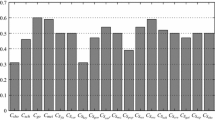Abstract
Coherence is a property of propositions hanging together or dovetailing with each other. About two decades ago, formal epistemologists started to engage in the project of explicating the seemingly elusive concept of coherence by means of probability theory. Since then, a plethora of coherence measures have been discussed in the literature. In this paper, we propose a general framework for coherence measures that encompasses the different frameworks of deviation measures, overlap measures and mutual support measures of coherence. Above that we show that some of the new measures that can be obtained outperform existing coherence measures in important respects.
Similar content being viewed by others
References
BonJour, L., The dialectic of foundationalism and coherentism, in J. Greco and E. Sosa, (eds.), The Blackwell Guide to Epistemology, Blackwell Publishing Inc, Malden MA, 1999, pp. 117–142.
Crupi, V., Confirmation, in E. N. Zalta, (ed.), The Stanford Encyclopedia of Philosophy. Fall 2014 edition, 2014.
Crupi, V., Generalized confirmation and relevance measures, in M. Massimi, J.-W. Romeijn, and G. Schurz, (eds.), EPSA15 Selected Papers, Cham. Springer International Publishing, 2017, pp. 285–295.
Douven, I., and W. Meijs, Measuring coherence, Synthese 156:405–425, 2007.
Earman, J., Bayes or Bust? A Critical Examination of Bayesian Confirmation Theory, MIT Press, 1992.
Fitelson, B., The plurality of Bayesian measures of confirmation and the problem of measure sensitivity, Philosophy of Science 66(3):362–378, 1999.
Fitelson, B., A probabilistic theory of coherence, Analysis 63:194–199, 2003.
Glass, D. H., Coherence, explanation, and Bayesian networks, in M. O’Neill, R. F. E. Sutcliffe, C. Ryan, M. Eaton, and N. J. L. Griffith, (eds.), Artificial Intelligence and Cognitive Science. 13th Irish Conference, AICS 2002, Limerick, Ireland, September 2002, Springer, Berlin, 2002, pp. 177–182.
Glass, D. H., Problems with priors in probabilistic measures of coherence, Erkenntnis 63:375–385, 2005.
Hammersley, J. M., and D. C. Handscomb, Monte Carlo Methods, Methuen & Co Ltd., London, 1964.
Kolmogorov, A., Foundations of the Theory of Probability, AMS Chelsea Publishing, New York, 1956.
Koscholke, J., Evaluating test cases for probabilistic measures of coherence, Erkenntnis 81(1):155–181, 2015.
Koscholke, J., Carnap’s relevance measure as probabilistic measure of coherence. Erkenntnis 2016, pp. 1–12.
Koscholke, J., and M. Schippers, Coherence and common causes: Against relevance-sensitive measures of coherence. British Journal for the Philosophy of Science 2016, pp. 1–12.
Koscholke, J., M. Schippers, and A. Stegmann, New hope for relative overlap measures of coherence. Manuscript, 2018.
Lewis, C. I., An Analysis of Knowledge and Valuation. Open Court, LaSalle, 1946.
Matsumoto, M., and T. Nishimura, Mersenne Twister: A 623-dimensionally equidistributed uniform pseudorandom number generator. ACM Transactions on Modeling and Computer Simulation 8(1):3–30, 1998.
Meijs, W., Probabilistic Measures of Coherence. PhD thesis, Erasmus University, Rotterdam, 2005.
Meijs, W., Coherence as generalized logical equivalence. Erkenntnis 64:231–252, 2006.
Meijs, W., A corrective to Bovens and Hartmanns measure of coherence. Philosophical Studies 133(2):151–180, 2007.
Olsson, E. J., What is the problem of coherence and truth? The Journal of Philosophy 94:246–272, 2002.
Rescher, N., The Coherence Theory of Truth, Oxford University Press, Oxford, 1973.
Roche, W., Coherence and probability: A probabilistic account of coherence, in M. Araszkiewicz, and J. Savelka, (eds.), Coherence: Insights from philosophy, jurisprudence and artificial intelligence, Springer, Dordrecht. 2013, pp. 59–91.
Schippers, M., Incoherence and inconsistency, The Review of Symbolic Logic 7:511–528, 2014.
Schippers, M., and G. Schurz, Genuine coherence as mutual confirmation between content elements. Studia Logica 105(2):299–329, 2017.
Schupbach, J., N., New hope for Shogenji’s coherence measure, British Journal for the Philosophy of Science 62(1):125–142, 2011.
Shogenji, T., Is coherence truth conducive? Analysis 59:338–345, 1999.
Spearman, C., The proof and measurement of association between two things, The American Journal of Psychology 15(1):72–101, 1904.
Author information
Authors and Affiliations
Corresponding author
Additional information
Publisher's Note
Springer Nature remains neutral with regard to jurisdictional claims in published maps and institutional affiliations.
Presented by Jacek Malinowski
Rights and permissions
About this article
Cite this article
Schippers, M., Koscholke, J. A General Framework for Probabilistic Measures of Coherence. Stud Logica 108, 395–424 (2020). https://doi.org/10.1007/s11225-019-09848-3
Received:
Published:
Issue Date:
DOI: https://doi.org/10.1007/s11225-019-09848-3




